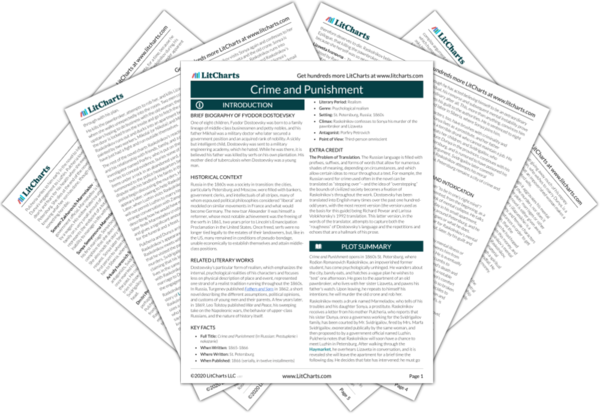Summary
Analysis
Raskolnikov hurries to Svidrigailov’s and worries that the latter has already seen Porfiry. Raskolnikov wonders whether it is worth it at all to further attempt to conceal his guilt. Raskolnikov worries, too, that Svidrigailov will use the information he has against Raskolnikov to blackmail him and gain power of Dunya. He fears that Razumikhin, who still knows nothing of his guilt, will not be able to stop Svidrigailov from getting to Dunya.
Svidrigailov represents the final piece of the puzzle. If Raskolnikov can find him before Svidrigailov speaks to Porfiry, then there is a chance Porfiry will never learn of Raskolnikov’s confession, and Raskolnikov will be able to dispute any charges against him in court. Reaching Svidrigailov will also prevent him from wooing Dunya or from attempting to harm her if she will not elope with him.
Themes
Raskolnikov passes through the Haymarket and sees Svidrigailov seated in a tavern; the latter attempts to leave but thinks better of it and calls to Raskolnikov to join him. Raskolnikov says that he was going to meet Svidrigailov at his house, but that he typically doesn’t go this way through the Haymarket—their meeting in the tavern is a coincidence.
Another coincidence having to do with the Haymarket. Svidrigailov has been seated there as if by chance, and if Raskolnikov had not stopped at that particular moment, he would not have run into the man himself, thus delaying their conversation.
Themes
Svidrigailov replies that, though Raskolnikov has been in a daze for the past 48 hours, Svidrigailov actually suggested this as a meeting place; therefore it is not fate but actually the product of a previous conversation.
Yet the coincidence just above is undercut when Svidrigailov announces that he has mentioned this location to Raskolnikov before. It is Raskolnikov’s memory that has failed; there is in fact no coincidence.
Themes
Raskolnikov says that, if Svidrigailov believes he has power over him, Svidrigailov might be surprised to learn that Raskolnikov cares less for his circumstances than would a “normal” man. He is growing weary of covering his tracks. Svidrigailov replies that he is simply “bored,” a depraved man without a profession, and he was hoping Raskolnikov would “tell him something new.”
Svidrigailov and Raskolnikov both approach a kind of nihilism from different philosophical directions. Raskolnikov is tired of fighting the charges against him—he merely wishes to calm his anxieties. Svidrigailov, on the other hand, has always lived a life of dissipation and nothingness—he wishes only to be entertained, either by women or a good time.
Themes
Get the entire Crime and Punishment LitChart as a printable PDF.

Svidrigailov has been drinking one glass of wine quite slowly, but it has “gone to his head” and he becomes inebriated. When Raskolnikov asks in jest whether Svidrigailov would ever consider shooting himself, to allay his boredom, Svidrigailov grows nervous—he does not like to hear the topic of death discussed. He decides to tell Raskolnikov the story of the new woman he has met in Petersburg, who has attempted to “save” and reform him.
An instance of foreshadowing. Svidrigailov does not like speaking of death, but in a moment of despair later in the novel he will take his own life. Svidrigailov decides, on Raskolnikov’s urging, to relate the story of his own life. This makes clear, again, that Raskolnikov actually rather enjoys speaking with Svidrigailov; he does not like Svidrigailov’s designs on his sister, however. Note also the parallel between the girl who is trying to save and reform Svidrigailov and Sonya's efforts with Raskolnikov.
Themes












